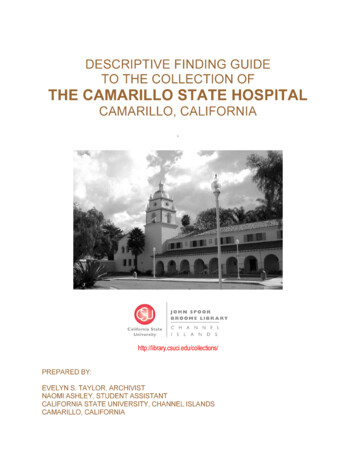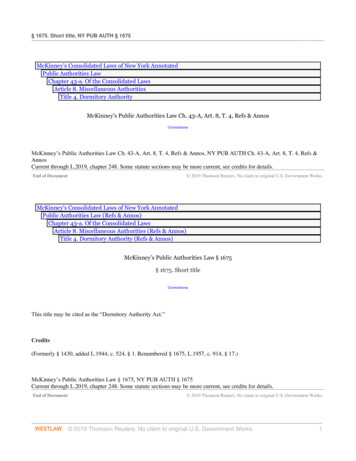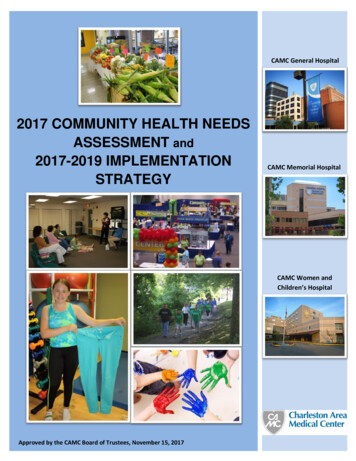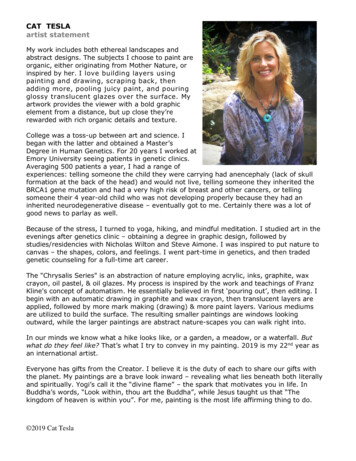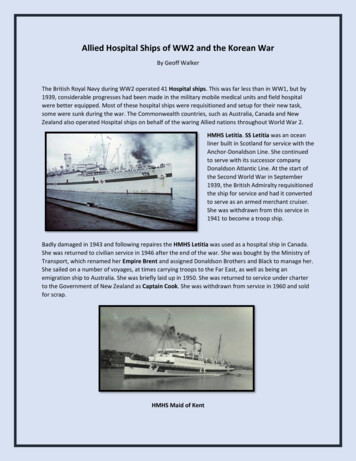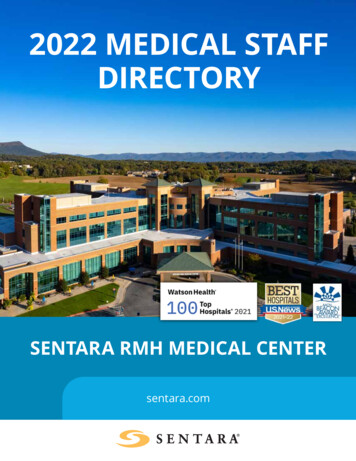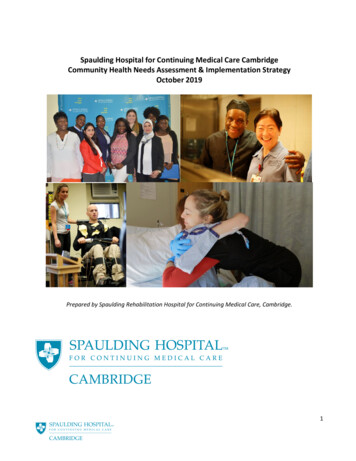
Transcription
Spaulding Hospital for Continuing Medical Care CambridgeCommunity Health Needs Assessment & Implementation StrategyOctober 2019Prepared by Spaulding Rehabilitation Hospital for Continuing Medical Care, Cambridge.1
I. Who We AreSpaulding Hospital Cambridge is a 180-bed long term acute care hospital (LTAC) located on a 7-acre campus inhistoric Cambridge, MA. As an LTAC hospital, Spaulding Cambridge provides a wide range of services for adultsand elders with multiple or complex medical conditions. Spaulding Cambridge is a member of the SpauldingRehabilitation Network and Partners HealthCare System, and cares for medically complex patients from theBoston area as well as from greater New England.Spaulding Hospital Cambridge has a rich history in the medical community, and was founded in 1895 by theSisters of Charity of Montreal as The Holy Ghost Hospital for Incurables. In 1970, The Holy Ghost Hospitalchanged its name to Youville Hospital, in memory of their founder, Marguerite D’Youville, a saint who wascanonized by Pope John Paul II in 1990. In 2001, Youville Hospital formed a joint-venture with SpauldingRehabilitation Hospital, formalizing a partnership to provide high quality medical and rehabilitation care. In2009 Spaulding purchased Youville and officially changed its name to Spaulding Hospital for ContinuingMedical Care Cambridge.As part of Spaulding Rehabilitation Network, Spaulding Cambridge has access to the resources of a world-classteaching and research institution. Spaulding Rehabilitation Hospital, the flagship facility of the SpauldingRehabilitation Network, is one of the largest inpatient rehabilitation hospitals in the United States and hasconsistently been ranked among U.S. News and World Report’s Best Hospitals since 1995. The SpauldingRehabilitation Network (SRN) offers a wide range of inpatient programs and 25 outpatient centers throughoutEastern Massachusetts. SRN strives to continually update and improve its programs to offer patients thelatest, high-quality care through its leading, expert providers.Spaulding Hospital Cambridge’s community benefit program addresses factors that impact access to care, andthe health and quality of life of our patients, their families, and the communities in which they live. Thesefactors often require interventions that are outside the traditional clinical, teaching, and research roles ofhospital. Every three years, through a community health needs assessment, collaborative planning withcommunity partners and hospital leadership, and with particular attention to the social determinants of healthand opportunities for disease prevention and wellness promotion, Spaulding Cambridge develops acomprehensive community benefit plan. This report describes Spaulding Cambridge’s mission and communitybenefit report for the final year of the cycle (FY19 - October 1, 2018-September 30, 2019).II. Our MissionSpaulding Cambridge joins the Spaulding Rehabilitation Network in our work to enable persons to achievetheir highest level of function, independence, and performance through the following mission: To provide a full continuum of rehabilitative care, and community-based rehabilitation services. To contribute to new knowledge and treatment approaches to rehabilitation and disease and injurymanagement through research and outcome studies. To educate future rehabilitation specialists, including physicians, nurses, therapists, and other alliedhealth professionals. To advocate for persons with disabilities.2
III. Our Community Health Needs Assessment Planning ProcessIn FY19, an internal working group at Spaulding Hospital Cambridge conducted a community health needsassessment as part of a continuous quality improvement approach to community benefit planning. In 2016,in compliance with section 501(r)(3) of the Internal Revenue Code, Spaulding Cambridge conducted itsfirst Community Health Assessment using a collaborative and dynamic approach to review available data,existing programs, and views from people who represent the broad interest of the community served bythe hospital.This year’s assessment included a review of patient data from the past year (October 1, 2018-September 30,2019), a review of publicly available health and demographic data, and interviews with internal andcommunity partners. Based on the assessment findings, the working group refined the community benefitagenda from 2016. Given the specialty nature of the care provided and the broad geographic reach of ourpatients, we define our primary community served beyond our immediate geographic location, butinstead on our specific patient population: the elderly, those persons with complex and chronic healthconditions and persons living with a disability.Both quantitative and qualitative data were collected for this CHA in order to help identify major aspectsof the community that impact the health of its priority populations. The data were evaluated through aSocial Determinants of Health lens, by considering the economic, environmental, and social factors thatinfluence health.The programs and initiatives identified by the working group support the overall needs identified by the healthassessment and described progress made in FY19 and plans for FY20-FY22. On November 6, 2019, the planwas reviewed and approved by the Spaulding Cambridge Board of Trustees. Appendix A provides a list ofworking group members and senior leaders involved in the assessment planning.IV. Our Target CommunitiesSpaulding Hospital Cambridge is located in Cambridge, Massachusetts, but its community of patients knowsno hard and fast borders. Given the highly specialized role we fulfill as a provider, our commitment to thecommunities we serve has traditionally been guided by the needs of our patient population rather thangeography. We especially focus on those who are most vulnerable or face significant barriers to accessingcare.For the purpose of Spaulding Cambridge’s community benefit program, we define our “community” byunderstanding who we serve and where they live. The analysis of patient data showed that, in the past year,Spaulding Cambridge served 1189 patients.3
Of those, 963 (81%) were from Massachusetts, 211 (18%) were from out of state, and 15 (1%) wereinternational patients. (See Figure 1).Figure 1. Top 10 Communities Served by Spaulding Cambridge in ordLynnDorchesterMaldenEverettSubtotal# of Patients41272423232221161613226Percentage of SHC .8%As a licensed long-term acute care hospital (LTAC), Spaulding Cambridge provides care to medically complexpatients who require ongoing hospital level care beyond their stay at an acute care hospital. Patients atSpaulding Cambridge have often received care at an intensive care unit (ICU) or require ventilator support,requiring more medically complex care than in a skilled nursing facility or rehabilitation hospital.For FY18, Spaulding Cambridge treated a range of patients with conditions that reflect this medicalcomplexity. (Figure 2)Figure 2. SHC FY19 Top 7 Discharge DiagnosisDischarge DiagnosisComplex MedicalOncologyPulmonary MedicineCardiologyVentilatorNeurologyDisorders of ConsciousnessNumbers of Patients Treated431236148106988848Spaulding’s patients age reflects the medical complexity and vulnerable nature of care we provide. SpauldingCambridge’s patients are older than the state and community average with over 43% over age 66, 32% ages51-65, 16% ages 31-50 and 9% under age 30.Spaulding Cambridge’s patients overwhelmingly speak English as their primary language (90%), withSpaulding, Russian, Portuguese and Arabic all representing 1% of our patients. 80% of Spaulding Cambridgepatients are Caucasian, 7% African American, and 4% Asian.4
By understanding the reach of geography of our patients and the overall patient population served, we wereable to identify the targets for Spaulding Cambridge’s community benefit program to prioritize initiatives thataddress social determinants of health and improve access to care, particularly for the elderly and peoplewith disabilities.V. Our Community Benefits Goal and ObjectivesThe goal of Spaulding Hospital Cambridge’s community benefit program is to “improve the health and qualityof life of our patients and other members of the Spaulding Rehabilitation Network community, particularly forpersons recovering from, or learning to live fully with illness, injury and disability.”Four priority areas were identified through the process, along with objectives to address each of the programpriorities:Priority AreaAddressing the social determinants ofhealthImproving access to carePromoting wellness and preventinginjury and diseaseImproving the social environment andopportunities for those withdisabilitiesObjectiveTo increase opportunities for educational and professionaladvancementTo reduce barriers to health careTo increase wellness and prevent injury and disease, especially forseniors and those with disabilitiesTo decrease isolation and increase social-emotional support forpeople with disabilitiesVI. Our FY19 Community Benefit Program Activities and FY20 PlanA. Addressing the social determinants of health/Workforce Development (WFD):Spaulding is committed to addressing the social determinants of health, including chronic unemployment forpeople with disabilities and the underemployment of community members with socioeconomic limitations tofurther education. The Spaulding Cambridge Community Benefit Program supported the following initiatives inFY19 to increase opportunities for education and professional advancement for these disadvantagedcommunities.College for America is an online college education program that has partnered with Partners Hospitals toprovide employees with an avenue to achieve higher education. College for America is a stackable programthat allows employees to earn credit toward multiple degrees with no limits making it less expensive foremployee who wish to graduate sooner, but also allow employees to work at their own pace. Spaulding paysthe tuition for employees in good standing looking to further their education and career opportunities.The Holiday Food Pantry is annual event at the hospital through which staff donate shelf stable food for localfamilies in need to combat hunger and food security over the holidays. Staff of the Spaulding National RunningCenter also volunteered at Coast Kitchen (Cambridge Community Center) and Friday Café (First Church inCambridge).5
JobLab is dedicated employment training space available to our community partners at no charge. We areparticularly targeted toward groups working with people with disabilities in alignment with the SRN mission.Our common goal is for the program participants to join the workforce upon completion. All courses are runindependently of SHC by the community partners. Available resources include convening space, desktopcomputers for up to 20 students, a teaching workstation with projector, practice interview rooms and trainingmaterial storage. Spaulding Cambridge and JobLab hosted Partners for Youth with Disabilities for weeklyevening classes in FY18.Just-A-Start (JAS) was founded in 1968 as a community revitalization and youth training program focused onimproving Cambridge’s neighborhoods. JAS YouthBuild program is a full-time comprehensive youthdevelopment program for 16 to 24 year-old out of school youth that provides education leading to grade levelincreases and credential attainment (high school diploma or HiSET – formerly GED); career exploration andemployment skills building; and leadership and life skills training.JAS’s primary service area is Cambridge. As a community development corporation (CDC), Just-A-Start (JAS) isdedicated to building the housing security and economic stability of low- to moderate-income people inCambridge and nearby communities. Through comprehensive and integrated programs, JAS creates andmaintains affordable housing, provides housing resources and services, offers education and workforcetraining for youth and adults, and builds community engagement.Spaulding Hospital Cambridge has partnered with the Just-A-Start Program (under the umbrella of theCambridge Housing Authority) to provide mock-interviews, job shadowing, coaching and facility tours toCambridge Youth. Staff volunteer to attend workshops at the school to speak with participants about variouspathways to employment in the healthcare industry for both clinical and non-clinical positions. We have alsohosted interns to assist Cambridge youth in exploring career opportunities in healthcare.Jewish Vocational Services (JVS) Boston is one of the largest and most impactful workforcedevelopment organizations in New England. Spaulding Cambridge partners with JVC to empower individualsfrom diverse communities to find employment and build careers, while partnering with employers to hire,develop, and retain productive workforces. Spaulding has partnered with JVS for 5 PCA training cohortsbetween Spring of 2017 and August 2019. The course is eight weeks in length and includes a four-day clinicalrotation in a Spaulding facility. JVS recruited a variety of diverse participants from their networks ofnewcomers, jobseekers with the state career centers. As a result of these trainings, in FY19 11 individualswere offered employment.Triangle Ink is a training program that helps people with behavioral disabilities, who have been chronicallyunemployed, to gain carrier readiness skills. Spaulding partners with Triangle Ink to provide skill training tothree classes of 20 to train students for skills necessary for careers as CNAs or Home Health Aides. Spauldingworked to Triangle to provide the program attendees with hands-on work experience and placements.InitiativeTarget PopulationCommunity ServedMeasureCost/resourcesexpended this yearCollege for AmericaSHC employeesGreaterCambridge/metro Boston3 participants 60006
Holiday Food PantryLow-income familiesCambridgeJobLabUnemployed orunderemployed peopleand youth withdisabilitiesYouth age 16-24 needingeducation certificationsPotential SRN employees,great communityGreaterCambridge/metro BostonPeople with behavioraldisabilities who arechronically unemployedGreaterCambridge/metro BostonJust-A-Start (JAS)JVS BostonTriangle Ink1000 poundsof fooddonated20 studentsCambridge 660 92,000 800GreaterCambridge/metro Boston3 classes, 11studentshired3 classes 16,000TOTAL: 117,960 2500FY20 Community Benefit Plan for Addressing the Social Determinants of Health:To increase opportunities for education and professional advancement, the Spaulding Cambridge CommunityBenefit Program plans to support the following initiatives in FY20.InitiativeCollege for AmericaHoliday Food PantryJobLabJust-A-Start (JAS)JVS BostonTriangle InkFY20 TargetAt least 3 participantsAt least 1000 pounds of food donatedAt least 20 studentsAt least 2 classes, 20 studentsAt least 3 classes, 11 students hiredAt least 3 classesB. Improving Access to CareTo reduce barriers to health care, the Spaulding Cambridge Community Benefit Program provides free care topatients whose care would not otherwise be fully supported by their payers. In FY19, Spaulding Cambridgeprovided the following Free Care 1:FY18 Free Care provided totaled 1.056MFY20 Community Benefit Plan for Improving Access to Care:To reduce barriers to health care, the Spaulding Cambridge Community Benefit Program plans to support freecare patients in need in FY20. Although it is difficult to anticipate the payers and coverage associated with1The in- and out-patient free care was associated with patients that have Mass Health Limited, in which post-acutepatients do not participate, as well as patients who received in-patient services whose primary coverages were exhaustedand who then converted to Mass Health Limited and whose charges were written-off to non-covered services.7
patients who may need such assistance in the year ahead, Spaulding Cambridge assumes the cost of noncovered services may be comparable to those of FY20 ( 1.056M)C. Promoting Wellness and Preventing Injury and DiseaseTo increase wellness and prevent injury and disease, especially for children, seniors, and those withdisabilities, Spaulding Cambridge Community Benefit Program supported the following initiatives in FY19.Boston Abilities Expo is a regional conference and exhibition where companies and organizations gather toshare knowledge and solutions to different disability challenges. Several workshops are free and to the public,including one offered by Spaulding entitled “Adaptive Sports: Benefits, Trends and Options.” Spaulding RehabNetwork physical therapists answered questions and discussed adaptive sports while also hosting aninteractive demonstration activity.Exercise for People with Disabilities (ExPD) is a program that provides suitable exercise activities for health,leisure and sport for people with disabilities such as spinal cord injury, cerebral palsy, multiple sclerosis, andperipheral neuropathy. The ExPD program is overseen by Exercise Physiologists, who are trained in keepingindividuals with chronic diseases, such as Spinal Cord Injury, as fit and healthy as possible through the use ofaerobic conditioning and strength training. Our team is familiar with a wide range of chronic conditions and isexperienced in advanced technologies such as oxygen consumption measurement and heart rate monitoring.Currently, the EXPD program is the only program in the United States that offers FES rowing, giving our staffunparalleled expertise in this emerging form of exercise.Community wellness outreach and information tables are offered throughout the year at a variety ofcommunity events. In FY19, staff from the Spaulding National Running Center provided information aboutproper stretching and injury prevention at the Bionic 5K Road Race and Somerville Honor Run. They alsohosted students from Cambridge Rindge & Latin High School to participate in National Biomechanics Day toprovide education about careers in biomechanics. Staff from the INSPIRE Lab had an informational table at theSpinal Cord Injury (SCI) Awareness Day and United Spinal ‘Roll & Stroll’ event about SCI prevention andavailable research studies at Spaulding Hospital Cambridge.The Physical Activity Webinar was created by Spaulding Rehabilitation Hospital, the Health and DisabilityProgram at the Massachusetts Department of Public Health, the Paralyzed Veterans of America, NationalCenter on Health, Physical Activity and Disability. The webinar focused on educating people who havedisabilities and their care takers on topics such as how to choose a fitness center, the model of disability,barriers to inclusion, and exercise programming for those living with a disability.InitiativeTarget PopulationCommunity ServedMeasureCost/resourcesexpended this yearBoston Abilities ExpoIndividuals withdisabilitiesGeneral public, childrenand families, athletes,people with disabilitiesStatewide3500attendees2000 people 6,000Community WellnessOutreachGreaterCambridge/metro Boston 4,0008
Physical ActivityWebinarIndividuals withdisabilitiesStatewide and beyond50participantsTOTAL 1,000 11,000FY20 Community Benefit Plan for Promoting Wellness and Preventing Injury and DiseaseInitiativeMeasureBoston Abilities ExpoCommunity Wellness OutreachPhysical Activity WebinarAt least 3500 attendeesAt least 2000At least 50 participantsD. Improving the social environment and opportunities for those with disabilitiesAdvocacy with and on behalf of people with disabilities is core to the mission of Spaulding RehabilitationNetwork. To decrease isolation and increase social-emotional support for people with disabilities, theSpaulding Cambridge Community Benefit Program supported the following initiatives in FY19.The Americans with Disabilities Act (ADA) Day is a celebration held at the Spaulding hospitals on theanniversary of the passing of the ADA and raises awareness of disabilities and related issues. This year’s eventincluded an information booth and a treasure hunt in the hospital.Exercise for People with Disabilities (ExPD) is a program that provides suitable exercise activities for health,leisure and sport for people with disabilities such as spinal cord injury, cerebral palsy, multiple sclerosis, andperipheral neuropathy. The ExPD program is overseen by Exercise Physiologists, who are trained in keepingindividuals with chronic diseases, such as Spinal Cord Injury, as fit and healthy as possible through the use ofaerobic conditioning and strength training. Our team is familiar with a wide range of chronic conditions and isexperienced in advanced technologies such as oxygen consumption measurement and heart rate monitoring.Currently, the EXPD program is the only program in the United States that offers FES rowing, giving our staffunparalleled expertise in this emerging form of exercise.Community space and staffing is provided regularly on a weekly and monthly basis to multiple area supportgroup fitness activities, including: Boston Ballet Abilities Dance, Dean Center for Lyme Disease, Mid-CambridgeYoga, Neuro-Muscular Infection Treatment and Rehabilitation Group, Alcoholics Anonymous, NARANONFamily Group, Eating Disorder Support Group, Massachusetts Neurophysiological Society, and Mid-CambridgeNeighborhood Association.InitiativeTarget PopulationCommunity ServedMeasureCost/resourcesexpended this yearADA DayIndividuals withdisabilities and theirfamiliesIndividuals withdisabilitiesGreaterCambridge/metro Boston1000attendees 500GreaterCambridge/metro Boston200 patients 118,000Exercise for Peoplewith Disabilities(ExPd)9
Community spaceand staffing forgroupsGeneral public, familysupport groupsGreater Cambridge15 groups,over 650hoursTOTAL 43,600 162,100FY20 Community Benefit Plan for improving the social environment and opportunities for those withdisabilitiesTo increase wellness and prevent injury and disease, especially for the elderly and people with disabilities, theSpaulding Cambridge Community Benefit Program plans to support the following initiatives in FY20.InitiativeMeasureADA DayExercise for People with Disabilities (ExPd)Community space and staffing for groupsAt least 1000 attendeesAt least 200 patientsAt least 15 groups, over 650 hoursVII. Total FY19 Community Benefit Program InvestmentsPriority AreaAddressing the social determinants of healthImproving access to carePromoting wellness and preventing injury anddiseaseImproving the social environment andopportunities for those with disabilitiesTOTAL FY19 InvestmentFY19 Financial Investment 117,960 1,056,000 11,000 162,100 1,347,060APPENDIX A: Spaulding Cambridge Community Benefit Work Group MembersRebecca Kaiser, Chief of Staff, Spaulding Rehabilitation NetworkJoanne Fucile, VP of Operations, Spaulding CambridgeJack Carroll, Director, Human Resources, Spaulding CambridgeColleen Moran, Director, Workforce Programs, Spaulding Rehabilitation NetworkJulie Voegelin, Senior Director of Marketing, Spaulding Rehabilitation Network10
Spaulding Hospital Cambridge’s community benefit program addresses factors that impact access to care, and the health and quality of life of our patients, their families, and the communities in which they live. These factors often require interventions that are outside the tradit

